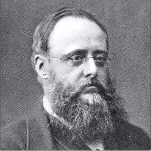William Wilkie Collins was born in Marylebone, London in 1824. His family enrolled him at the Maida Hill Academy in 1835, but then took him to France and Italy with them between 1836 and 1838. Collins later recalled that in Italy he learned more “which has been of use to me, among the scenery, the pictures, and the people, than I ever learned at school.” Returning to England, Collins attended Cole’s boarding school, and completed his education in 1841, after which he was apprenticed to the tea merchants Antrobus & Co. in the Strand.
In 1846, Collins became a law student at Lincoln’s Inn, and was called to the bar in 1851, although he never practiced. It was in 1848, a year after the death of his father, that he published his first book,
The Memoirs of the Life of William Collins, Esq., R.A., to good reviews. This was followed by an historical novel,
Antonina (1850) and three contemporary novels,
Basil (1852),
Hide and Seek (1854) and
The Dead Secret (1857). During the 1850s, however, Collins’ main source of income came through journalism. Primarily, he wrote for
Household Words, a publication owned and ran by Charles Dickens, with whom Collins had a close friendship. It was also during this decade that Collins began to take large amounts of opium to combat ‘rheumatic gout’, a form of arthritis he suffered from.
The 1860s saw Collins’ creative high-point, and it was during this decade that he achieved fame and critical acclaim, with his four major novels,
The Woman in White (1860),
No Name (1862),
Armadale (1866) and
The Moonstone (1868). These were all hugely popular;
The Woman in White, for example, ran to seven editions in the first year of publication, and is now regarded as the archetypal sensation novel.
The Moonstone, meanwhile is seen by many as the first true detective novel – T. S. Eliot called it “the first, the longest, and the best of modern English detective novels…in a genre invented by Collins and not by Poe.”
During the last two decades of his life, Collins’ popularity waned. This was due in part to the death of Dickens, and in part to his increasing dependence on opium. It also had a lot to do with his stylistic shift away from the sensational thrillers that his made his name onto works more centred on social commentary;
Jezebel’s Daughter (1880), for example, advocated humane treatment of lunatics, whilst
Heart and Science (1883) condemned vivisection. During the 1880s, Collins’ health declined rapidly. In June of 1889, Collins suffered a stroke, and died as a result of further complications three months later, aged 65.


